- Home
- Johnny D. Boggs
South by Southwest Page 2
South by Southwest Read online
Page 2
The rain stopped, but not the wind, and Zeb rolled over. He looked into the darkness toward the prison, but saw only the flaring lights of lanterns. A banjo strummed from inside those pine walls, and Zeb thought of Corporal Favour, of Private Gardenhire, and suddenly he recollected Sergeant Major Engstrand’s chubby, bespectacled face, and he started to cry.
No, no tears. I know my duty, Sergeant.
Damming the tears, he began pushing the mud back over his grave. He had to make it look as if nothing had been here but foul, evil, corpse-eating hogs. When he had finished, he backed his way into the woods, still watching the Stockade as the moon peeked from beneath the clouds, until he determined it was safe to begin his flight.
Which is the exact moment that a hand gripped Zeb’s shoulder.
Chapter Two
A cold rain, more mist than shower, fell for a spell, but as soon as the rain stopped, a quarter moon managed to peek out of the clouds, shining some light on the cemetery.
When Ebenezer Chase saw the shadowy figure of a hand clawing through the muddy dirt over that grave, like it was reaching to pull anybody nearby to the deepest parts of Hades, he thought he might be called to glory. It had been bad enough with those hogs rooting around, tugging on dead white men, hearing their teeth sink into rotting human flesh. Ebenezer thought he might scream, warn every man Jack in the Stockade, but nothing would come out of his throat.
He’d never been so scared.
Clouds swallowed the sliver of a moon, and rain drizzled again.
Backing into the woods, Ebenezer wondered if he should do what he had planned, or just hightail it back to Oliver Hall’s plantation, and forget his dreams, forget his family.
For sixteen years, all Ebenezer had known was slavery. His daddy had been in bondage up till his death from fever two summers ago; his mama remained a slave, and their parents and even their parents’ parents had been slaves. Ebenezer’s wife and daughter were also slaves, but not in Florence, not even in South Carolina. Last summer, Master Hall had sold them both. Sent them down with Master Hall’s brother to some far-off place called Dallas, Texas. Since that July day, Ebenezer had been dreaming of seeing them again. Dreaming of being free, of seeing sweet Lizzie and their baby, Tempie, free.
Without realizing it, while hiding in the woods beside the graveyard, Ebenezer had been playing with the wedding ring on his right pinky finger. Lizzie had given it to him, bawling, right before Master Hall’s brother took her away, just took her and little Tempie. Ebenezer had given Lizzie the ring, which Uncle Cain had carved out of a big red button, the day they jumped the broom and got married.
That had been the day Uncle Cain had said that he was going away, as far away as Texas, maybe the Western Territories, or California, and that, if Ebenezer ever wanted to run off, get free, he should seek out a white couple on Lynches River, northwest of Cartersville pike. “Names of Patricia and Tres Hudgens . . . they help free slaves, but don’t you never tells nobody about them,” Uncle Cain had said. Well, that had been Ebenezer’s wedding day, and he hadn’t given much thought to running off, or ever being free. Fact is, he had forgotten about Patricia and Tres Hudgens, and Lynches River, a few days after Uncle Cain disappeared—the first of Master Hall’s slaves to escape in twenty-two years, which infuriated Master Hall so much he made his overseer, Mr. Anderson, whip two field hands who had been close to Uncle Cain. They never told Hall or Anderson anything. Ebenezer doubted if those poor slaves knew anything to tell.
Uncle Cain was the last of the Hall Plantation slaves to run off.
Till now.
Certainly, since losing his wife and daughter, Ebenezer had often thought about taking to the swamps, heading north. It just had never struck him as how he could get free until he found himself burying a soldier boy who wasn’t dead. Afterward, when Ebenezer had returned to Hall Plantation, the image of that young soldier burned into his mind, and Ebenezer kept thinking of how that soldier planned to run off. So, without any real plan, that night Ebenezer had sneaked away from the plantation.
Maybe, he figured, this white boy, who looks no older than me, might help me. That’s what brings these Bluecoats to the South, Mama says. To bring us the jubilee. He might help me find my Lizzie and my baby girl. Help me get free.
Now, as the rain ceased once again and the moon reappeared, Ebenezer squatted, watching the Bluecoat fill up his grave with mud and grass as the hogs kept an eye on him from a distance. Ebenezer looked beyond the boneyard to the pine walls to make sure no soldier suspicioned that something peculiar was happening on this frigid night.
The boy started backing his way through the mud and dead grass and weeds, backed right up to where Ebenezer hid behind a sweet gum tree. Summoning up the courage, Ebenezer managed to get his right arm to work, and he gripped the young soldier’s shoulder.
Zeb Hogan rolled over like a wet dog, feisty, tossed Ebenezer’s arm off his body, and started kicking, giving the slave the what-for, but Ebenezer told him in a harsh whisper: “Easy there, Captain. Take it easy. You’ll get us both killed if you keep this up.”
That stopped Zeb. He stared, his face a mask of confusion, till the quarter moon hid behind rain clouds. Neither moved. Both too scared. Ebenezer looked off toward the Stockade, ears perked to catch the slightest noise, but all he could hear were branches rustling in the wind, and pigs snorting, grunting, rooting. The moon reappeared, and Ebenezer looked down at the soldier.
“What are you doing here?” Zeb Hogan asked.
“I was hoping to run off with you, Captain.”
“I’m a private, not a captain, and the answer’s no.”
Zeb eased up to a sitting position, and started rubbing his legs, his feet, trying to get the blood to flowing again. Ebenezer could tell by the soldier’s face that he was hurting bad, but Ebenezer could also see rugged determination in the boy.
“Captain,” Ebenezer told him, “I know this country. I can get you back to where your Army is.”
With a snort, Zeb Hogan looked the slave in the eye. “I’m not going to the 16th Wisconsin. I’m bound for Vicksburg, Mississippi.”
“Mississippi?” Ebenezer said. “That’s a Southern state.”
“That’s right. You best get gone, boy.”
“Vicksburg,” Ebenezer said. The Bluecoat didn’t respond. Ebenezer had never been outside of Florence or Darlington Counties much, except for that one time Mrs. Hall took him and his grandmother to Columbia to see Mrs. Hall’s sister get married. Once, however, before the Rebellion, an eternity ago, Mrs. Hall had shown Ebenezer a map of the United States. Ebenezer couldn’t remember everything on that map, but he knew that Mississippi had been fairly close to Texas. Closer than Florence County, that was certain sure.
“Listen, Captain, please . . .” Ebenezer began, but Zeb shut him up with a look of his hard eyes.
Ebenezer swallowed, looked away. A hog ran right past them, unnerving them both. Then the soldier was pulling himself to his feet, leaning against the sweet gum tree for support.
“My wife and baby girl are in Dallas, Texas,” Ebenezer begged. “I got to get to them.”
“I don’t care.”
“But you’re fighting to free us slaves.”
Zeb’s head shook. “I never joined the 16th to free slaves. I did it for James . . . I did it to preserve the Union. And I don’t need nobody, especially with a bunch of Secesh on my trail.”
“They won’t be looking for you.” Desperately Ebenezer pointed at the grave Zeb had covered over. “You’re dead.”
The Bluecoat pushed away from the tree, weaving a bit, but keeping his balance, and looked Ebenezer coldly in the eye.
“They’ll look for you,” he said, and Ebenezer knew the soldier was right.
His heart started sinking, and Ebenezer felt something running down his cheeks as the Bluecoat started walking away. Ebenezer stood there a bit, but soon turned to see the soldier’s back, and he called out softly: “Captain.”
The Bluecoat st
opped, looked over his shoulder. The moon disappeared again, and Ebenezer couldn’t see him, but he told the darkness: “You keep walking that way, you’ll wind up right back here. You’re heading straight to Florence Town. You need to be traveling west.”
The moon broke free again for just a moment, and Ebenezer hooked a thumb in the right direction. Zeb stared at the slave the longest time, but finally turned and followed the direction the thumb was pointing. Ebenezer thought he heard the young soldier whisper—“Thanks”—yet he wasn’t certain. Zeb kept walking through the woods, and Ebenezer stood there, wondering what he had gotten himself into. He felt all alone. It started raining again, harder this time, colder. He thought he might be able to make it back to Hall Plantation, if he were lucky, if those ’coon hounds were trying to keep out of the cold and wet. Even if he got caught sneaking back into his quarters, Mrs. Hall likely wouldn’t let Mr. Anderson whip him too badly.
Hall Plantation lay northeast of the Stockade, and Ebenezer started walking in that direction, but after traveling a quarter mile, he stopped, let out a sigh, and remembered what Uncle Cain had told him. Again, Ebenezer found himself playing with his wife’s wedding ring, and he pictured Lizzie and their baby. Before he knew it, Ebenezer had turned around, and started walking west.
* * * * *
Dawn found Ebenezer following the soldier boy a couple of miles from Florence. Maybe six or seven hours had passed since that Bluecoat had dug himself out of his grave, and he had traveled four or five miles. Ebenezer felt bitter. Who’s dumber, that captain who’s been walking in circles, or me for following him? Ebenezer could have—should have—abandoned the Bluecoat, and struck out on his own, but for Ebenezer the thought of being alone, truly alone, petrified him. This white boy’s all I got, he thought. For hours, Ebenezer had kept hoping the Bluecoat would wise up, and start heading west. After all, it could be downright tough to find your directions on a cloudy night. Maybe the soldier was waiting for sunrise, so he’d know which way he should start walking.
The Bluecoat did show enough smarts by staying in the woods. The boy had kept out of the clearings, the fields, the roads. Problem now was that he had wandered into the swamp country, but Ebenezer gave the soldier his due. The kid kept sloshing through mud and muck, through briars and brambles, the low-hanging Spanish moss, never once complaining. Never turning back.
A few minutes later, Ebenezer heard a little shriek, followed by a cuss. With a heavy sigh, Ebenezer ran deeper into the swamp to see what kind of trouble that soldier had gotten into. He found Zeb Hogan up past his stomach in a bog, thrashing around, sinking deeper and deeper, but savvy enough to latch his right hand around a vine. Grunting, gasping, he tried pulling himself up. The problem, Ebenezer could have told him, is that Carolina mud’s not ordinary. It takes hold of you, just won’t let go. The boy would try to climb on that vine, but the mud just sucked him back down.
“Hold still!” Ebenezer shouted, and the soldier’s eyes widened, his face paling until he saw the slave. Then his eyes hardened, and his face showed anger, irritation, maybe a touch of embarrassment. Ebenezer cautiously felt his way around that bog, not wanting to get into a predicament like the soldier was in. “Don’t let go of that vine,” Ebenezer said.
Zeb Hogan’s hands were black as tar from the mud, and he wiped the thick goo onto his long, dark hair, one hand at a time, keeping the other hand on the vine, his eyes never leaving Ebenezer Chase.
The runaway slave pulled out the knife he had stolen from Mrs. Hall’s kitchen the previous evening, and cut off about a six-foot vine. He tossed one end into the mud. “Pretend you’re swimming,” Ebenezer said.
Zeb Hogan just stared. His mouth opened, closed, without uttering a sound. At last, he shook his head and said, “I don’t know how.”
“You can’t swim?” Ebenezer could hardly believe it. He had been swimming as far back as he could remember.
“No,” Zeb snapped.
“Well.” Ebenezer shook his head. “Just kick your feet after you take hold of that vine. I’ll pull. You kick. We’ll work together, and get you out of there.”
Zeb stared at the end of the vine he had been tossed, but didn’t reach for it. Instead, he kept both hands on the vine he’d been holding.
“You don’t have enough strength to pull yourself out,” Ebenezer told him. “You need me.” He was thinking—And I need you—but wasn’t about to tell him that.
“You been following me!” Zeb sounded angry.
“Yeah. I been following you around in circles, but Lord, don’t ask me why. Because I don’t know. I’m a fool, I guess. Biggest fool ever born, if you ask me. I could be nigh to Lynches River by now, but I figured I’d better stick close to you.” Suddenly Ebenezer smiled. “Good thing, too, I reckon. For you.” The smile vanished, and Ebenezer pointed a long finger at the vine. “You grab that vine, Captain, or I’ll take my chances and leave you here. And that muddy grave you’re in, it’s not gonna be as shallow as the one I dug for you yesterday.”
It took some doing, but Zeb managed to let go of the vine, and grab hold of the one Ebenezer had pitched to him.
“All right.” Ebenezer pulled. With Zeb kicking, straining against the mud’s suction, Ebenezer backed through ankle-deep muck, finally reached firmer ground, heard a loud slurping sound, and fell onto his backside. Quickly he rose, splashed a path to the soldier, and pulled him the rest of the way out of the bog, through the muck, until both fell onto the wet leaves, chests heaving, sweating despite the morning chill.
When Ebenezer thought he could talk, he rolled over on his back, and slowly sat up. Zeb kept his eyes closed, his heart pounding, drawing in every breath like he thought it would be his last. Finally he opened his eyes, and pushed himself up. He looked at the black boy, wet his lips with his tongue, and said, “Thanks.”
“No need.” Ebenezer looked through the dense forest, found the sunlight peeking through the timbers, and pointed. “Yonder’s west.”
Zeb thanked the slave again, but made no move to stand, to start walking.
“Listen,” Ebenezer said. “If you don’t mind . . . I was hoping I could follow you a little ways.” Before Zeb could raise much of a protest, Ebenezer held out a palm and began explaining. “There’s a white couple on Lynches River. That’s twenty miles, or thereabouts, west of here. You’re going west. I’m going that way, too. These whites, they’re Southern, but they been helping runaway slaves. I figure they could help us both.”
Adamant, Zeb shook his head. He said he didn’t need any help.
Ebenezer just grinned. “You gonna walk all the way to Mississippi without any shoes or pants?” he asked, and enjoyed the look on that soldier’s face when he realized that the bog had sucked off his trousers—what passed for his britches, anyway—and the remnants of the shoes he had been wearing.
Zeb jumped to his feet, started back toward the mud, but stopped, like he was scared to get too close to that bog. Ebenezer couldn’t rightly blame him for that. Suddenly the soldier shook his head, balled his fingers into fists, and let out a little oath. His hands unclenched, and he buried his face into them. His shoulders shuddered, and Ebenezer, no longer smiling, heard the Bluecoat’s sobs. Ebenezer walked up to the soldier, hesitantly put his hand on his shoulder, and whispered: “Them Hudgenses. I know where they live. Uncle Cain . . . he told me. They helped him get free. They’ll help you, Captain. Help us both. We can work together, Captain.” Ebenezer shuddered. “We got to work together, Captain.”
The Bluecoat stepped away, and Ebenezer’s hand dropped by his side. Turning, Zeb Hogan took in a deep breath, and let it out slowly. “It’s not captain,” he told the slave again. For the longest while he just stared, like he was trying to make up his mind. Finally he did.
“The name’s Zeb,” he said. “Zeb Hogan.”
Chapter Three
“My name’s Ebenezer Chase,” the slave said. He started to say more, but before he could speak, they both heard the baying of hounds.
<
br /> “Come on!” Ebenezer grabbed Zeb’s left hand, jerking him into ankle-deep water. They started running, splashing, ducking underneath limbs, briars, vines, running so hard that their lungs felt as if they’d been set afire.
The thought of dogs chilled Zeb as he ran. The hounds might have belonged to the slave’s plantation owner, but they could also have been the curs of the South Carolina Reserves. The commandant loved siccing dogs on any Union soldier who tried to escape the Stockade, and Zeb couldn’t shake a grisly image from his mind—one of Colonel Forno’s pets, more wolf than dog, ripping Sergeant Major Engstrand’s legs to pieces, pulling him down from a tree, biting, slashing. Zeb had always thought those cuts and bites, and the infection that followed, wound up killing the sergeant major, not the typhoid pneumonia.
On the other hand, the dogs could be chasing the runaway slave. That was no good, either. Not for Zeb. But what could he do now? Other than run?
For two miles, the boys kept up that relentless pace, before Zeb stumbled, crashed into the wet leaves, and rolled over, chest about to explode, stomach turning over. He pulled himself to his knees and retched. Only there was nothing in his stomach to throw up. Beside him, the slave heaved too. Finally they just rolled on their backs, waiting till they could breathe right, waiting for their hearts to slow down. They stared up at those tall longleaf pines, listening.
“I . . . don’t . . . can’t hear . . . dogs,” Zeb managed.
“Yeah.” Ebenezer sat up. “But we got to keep running. ’Coon hounds can’t track us through water, but this swamp doesn’t go on forever, and Mister Anderson, Master Hall, or them Confederate guards, they’ll guess which way we’re both running.”
“West?” Zeb said. “Why . . . how?”
“I heard Mister Anderson talking about it the other day, talking to one of those Confederate officers at the Stockade. Said that Bluecoat Army is pushing toward Columbia. Makes sense that a runaway slave or a Union soldier would be trying to meet up with that outfit, don’t it?”

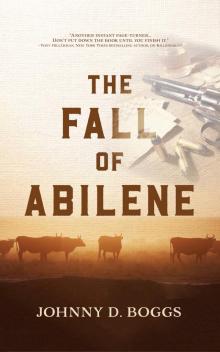 The Fall of Abilene
The Fall of Abilene A Thousand Texas Longhorns
A Thousand Texas Longhorns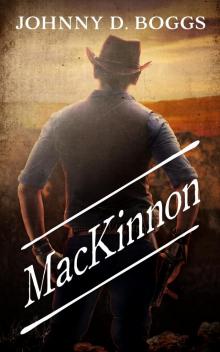 MacKinnon
MacKinnon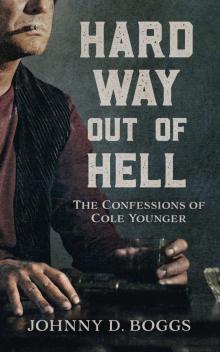 Hard Way Out of Hell
Hard Way Out of Hell Buckskin, Bloomers, and Me
Buckskin, Bloomers, and Me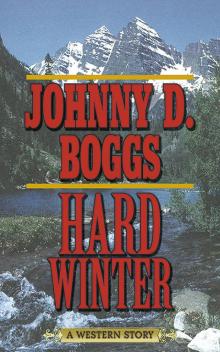 Hard Winter
Hard Winter Wreaths of Glory
Wreaths of Glory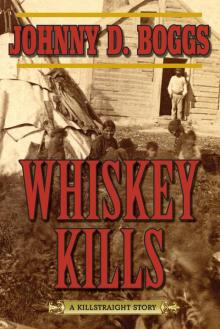 Whiskey Kills
Whiskey Kills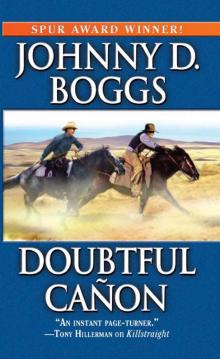 Doubtful Canon
Doubtful Canon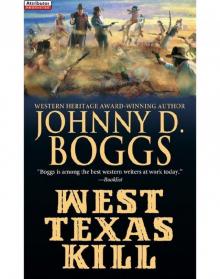 West Texas Kill
West Texas Kill The Killing Shot
The Killing Shot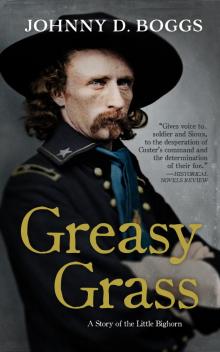 Greasy Grass
Greasy Grass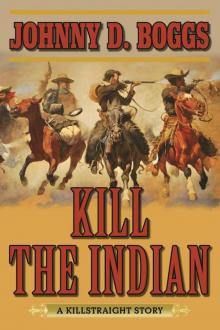 Kill the Indian
Kill the Indian Return to Red River
Return to Red River Northfield
Northfield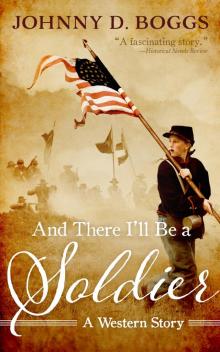 And There I’ll Be a Soldier
And There I’ll Be a Soldier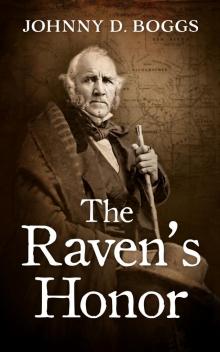 The Raven's Honor
The Raven's Honor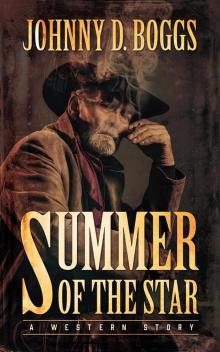 Summer of the Star
Summer of the Star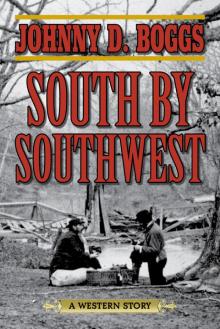 South by Southwest
South by Southwest Mojave
Mojave Valley of Fire
Valley of Fire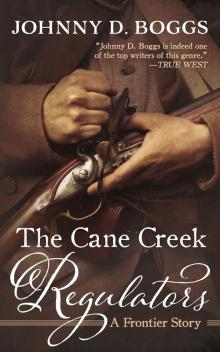 The Cane Creek Regulators
The Cane Creek Regulators